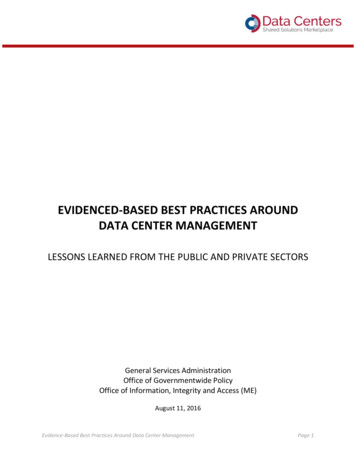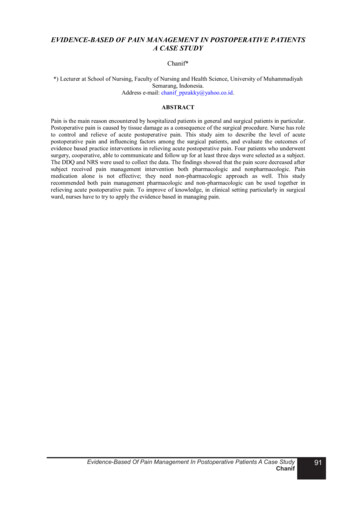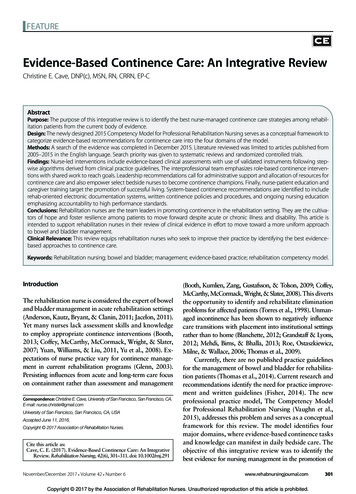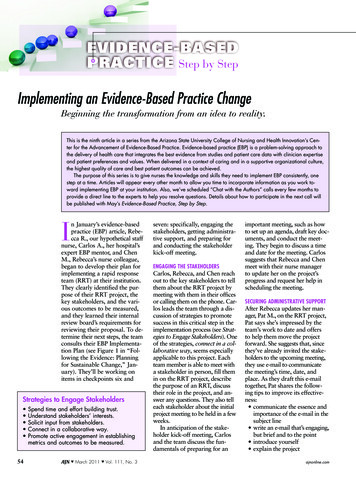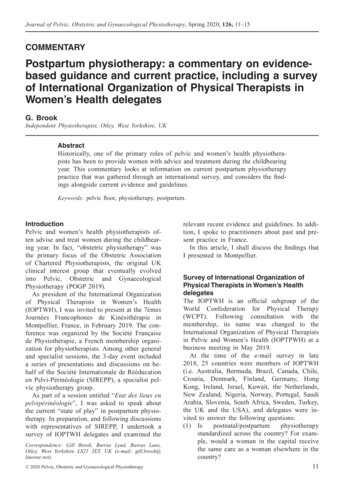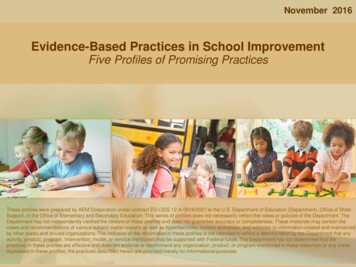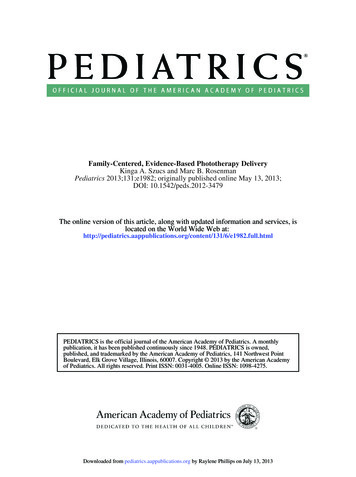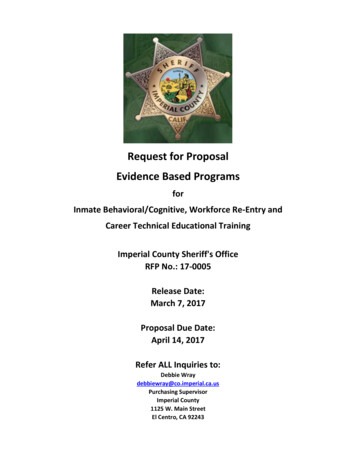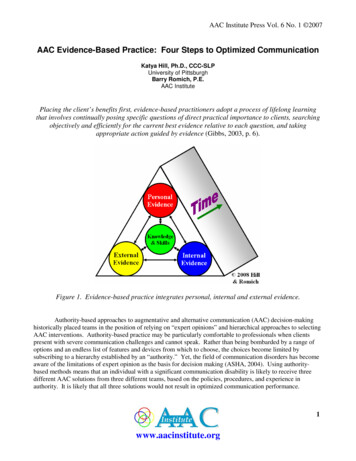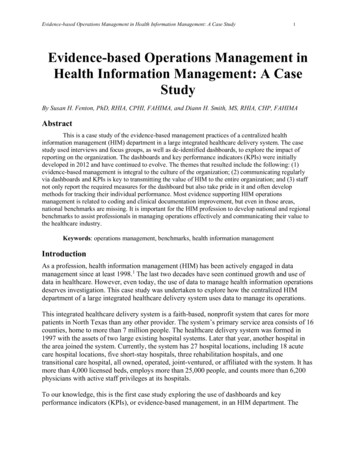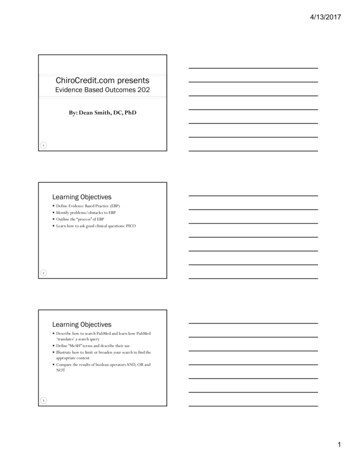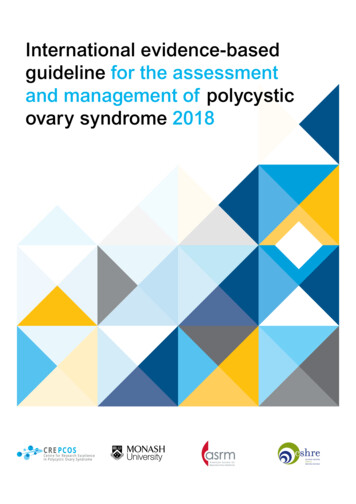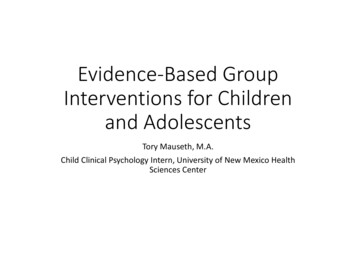
Transcription
Evidence-Based GroupInterventions for Childrenand AdolescentsTory Mauseth, M.A.Child Clinical Psychology Intern, University of New Mexico HealthSciences Center
Group Therapy Benefits Cost-effective Serve greater number of clients Peer support Greater empowerment Enhanced self-efficacy Improved social networks Effectiveness
Group Interventions Social Skills Depression Anxiety Obsessive-Compulsive Disorder Trauma Disruptive Behavior Divorce
Social Skills Skillstreaming UCLA PEERS Social Skills Group Intervention (S.S. Grin)
Social Skills: Skillstreaming Uses modeling, role-playing,performance feedback, andgeneralization Each book includes: Program content andimplementation Skill outlines and homeworkreports CD with reproducible forms andhandouts Tips for implementation inschools
Social Skills: Skillstreaming Skill Areas Friendship-Making SkillsDealing with FeelingsAlternatives to AggressionDealing with Stress Early Childhood Beginning Social Skills & School Related Skills Elementary School Child & Adolescent Classroom Survival Skills
Social Skills: rainings:LanguageMore informationPreschool-High SchoolAdaptableRequired:Program Book ( 45)Student Manual ( 13), Lessons Plans &Activities ( 65), other materialsOptional: Skillstreaming DVD - EducatorTraining (Includes Elementary and AdolescentProgram Books; 125)Englishwww.skillstreaming.com
Social Skills: UCLA PEERS The UCLA Program for the Education and Enrichment of RelationalSkills (PEERS) Evidence for use with teens with autism spectrum disorders Also treats ADHD, anxiety, depression Practice skills in session during real play activities Socialization homework assignments
Social Skills: UCLA PEERS Topics of Instruction How to use appropriate conversational skillsHow to find common interests by trading informationHow to appropriately use humorHow to enter and exit conversations between peersHow to handle rejection, teasing, and bullyingHow to handle rumors and gossipHow to be a good host during get-togethersHow to handle arguments and disagreementsHow to make phone calls to friendsHow to choose appropriate friendsHow to be a good sportHow to change a bad reputation
Social Skills: UCLA PEERSAges/Grades:Format:Small groups:Trainings:Middle School-High School14 90-minute sessionsMaterials Required: Manual ( 52)Required to be PEERS Certified4-day training ( 2200)Language:EnglishMore information: http://www.semel.ucla.edu/peers
Social Skills: S.S. Grin Social Skills Group Intervention(S.S. Grin)ECK-23-5High Functioning Autism (S.S.Grin – HFA) Adolescent (S.S. Grin-A)
Social Skills: S.S. Grin Proven to reduce school violence and increase social-emotionalcompetence Skills taught through dynamic instruction and practice (games &activities) Scripted lesson plans Modeling Positive reinforcement Cognitive reframing
Social Skills: S.S. GrinAges/GradesFormatMaterials Required:Trainings:Language:More informationPreschool-16 years old10-12 sessionsOnline Kit( 195- 265) or Physical Kit ( 595 795)Online training included in kit iew
Depression Penn Resiliency Program ACTION Adolescents Coping with Depression (CWD-A) & Group for Parents of DepressedYouth Coping with Stress Course (CWS)/POD-TEAMS Depression Prevention Program
Depression: Penn Resiliency Program Teaches cognitive-behavioral and social problem-solving skills Students learn to detect inaccurate thoughts evaluate the accuracy of those thoughts challenge negative beliefs by considering alternative interpretations
Depression: Penn Resiliency Program Students learn techniques for AssertivenessNegotiationDecision-makingSocial problem-solvingRelaxation Skills introduced through SkitsRole playsShort storiesCartoons Skills are practiced usinghypothetical situations
Depression: Penn Resiliency ProgramAges/Grades:Format:10-13 years old12 90-minute sessions or 18-24 60-minute sessions(some projects have used shorter versions)Small groupMaterials:Available for research purposesTrainings:3-10 daysGroup supervision every 1-2 weeksLanguage:EnglishMore information: http://www.ppc.sas.upenn.edu/prpsum.htm
Depression: ACTION Skills taught using didacticpresentations and experientialactivities rehearsed during in-sessionactivities applied through therapeutichomework
Depression: ACTION Components Psycho-educationGoal settingBehavioral activationCoping skills and emotion regulation skills trainingProblem solving skillsCognitive restructuringImprovement in forcementSocial reinforcementInterpersonal skills
Depression: ACTIONAges/Grades9-14 years oldFemalesFormat20 60-minute group sessions 2 60-minuteindividual sessionsGroups of 4-6MaterialsChild Workbook ( 27)Therapist Manual ( 24)TrainingsNot requiredContact developerLanguageEnglish, Spanish, DutchMore information www.workbookpublishing.com
Depression: Adolescents Coping withDepression (CWD-A) CBT treatment for activelydepressed adolescents Accompanying parent group: “Group for Parents of DepressedYouth” Skills RelaxationPleasant activitiesConstructive thinkingSocial skillsCommunicationNegotiationProblem Solving
Depression: Adolescents Coping withDepression sLanguageMore informationAdolescents16 2-hour sessionsTeen Workbook (free)Manual (free)Not c/acwd/acwd.html
Depression: Group for Parents of DepressedYouthAges/GradesFormatMaterialsParents of adolescents receiving CWD-A8 2-hour sessionsParent Manual (free)Parent Workbook (free)TrainingsNot requiredLanguageEnglishMore information l
Depression: Coping with Stress Course (CWS)/PODTEAMS Depression Prevention Program CBT treatment for adolescents at risk of becoming depressed past episode of depressionpersistent subdiagnostic dysphoria and/or other depressive symptomsdepressed parentsbeing a pregnant, single teen motherhaving some other known risk factor for depression.
Depression: Coping with Stress Course (CWS)/PODTEAMS Depression Prevention Program Topics Psychoeducation Cognitive-restructuring skills Techniques for modifying irrationaland negative self-statements andthoughts Instruction Lectures Discussion Activities Demonstration Group Team Role-playing Homework
Depression: Coping with Stress Course (CWS)/PODTEAMS Depression Prevention entsCWS: 15 1-hour sessions 2-4 times per week8 90-minute sessions once a weekSmall groupTeen Workbook (free)Therapist Manual (free)Not requiredEnglishTrainingsLanguageMore information l
Anxiety Coping CatCool KidsSocial Effectiveness Therapy for Children & AdolescentsParent groups Keys to Parenting your Anxious ChildHelping Your Anxious Child: A Step-by-Step Guide for Parents
Anxiety: Coping Cat Components: Psychoeducation Exposure tasks Somatic management (includingrelaxation) Cognitive restructuring Problem solving
Anxiety: Coping Cat Cognitive restructuring addresses FEAR: Feeling frightenedExpecting bad thingsAttitudes and actions that will helpResults and rewards
Anxiety: Coping CatAges/GradesFormat7-13 years old16 50-minute weekly sessionsGroups of 4-5MaterialsChild Workbook ( 27)Therapist Manual ( 24)TrainingsNot requiredLanguageEnglish, Spanish, Chinese, Japanese, Hungarian,NorwegianMore information www.workbookpublishing.com
Anxiety: Cool Kids Components: PsychoeducationCognitive restructuringParent skillsIn-vivo exposureSocial skillsCoping strategies Specific adaptation for schools
Anxiety: Cook 7 years oldPrevention program for 3-6-year-olds also available12 60-minute weekly sessionsGroups of 6-8Cool Kids Program Kit (Therapist Manual 1 ParentWorkbook 1 Child Workbook; 60 AUS)Workbooks (Parent & Child; 32 AUS)Not requiredEnglish, Spanish, Chinese, Danish, Icelandic, Korean,Swedish, TurkishMore pages/resourcesproducts.aspx
Anxiety: Social Effectiveness Therapy forChildren & Adolescents (SET-C) Behavioral treatment for social phobia Components: Social skills trainingPeer generalization sessionsIndividual exposure therapy sessionsBrief parent-education
Anxiety: Social Effectiveness Therapy forChildren & Adolescents (SET-C)Ages/GradesFormatMaterials7-17 years oldChild and adolescents with social phobia12 weekly 60-minute social skills training 90-minutepeer generalization sessions 60-minute individualexposure sessionsGroups of 6 with 2 therapistsSET-C Complete Kit (Therapist Guide 6 ParentGuides other materials; 193)Therapist Guide( 60)TrainingsNot requiredEnglishLanguageMore wujhrgrjg))/product.aspx?gr edu&prod setc&id overview
Anxiety: Parent Groups Keys to Parenting your AnxiousChild Katharina Manassis, M.D.Second Edition, 2008Barron’s Educational Series192 pages
Anxiety: Parent Groups Helping Your Anxious Child: AStep-by-Step Guide for Parents Ronald Rapee, PhD; Ann Wignall,PsyD; Susan Spence, PhD, HeidiLyneham, PhD; Vanessa Cobham,PhD Second Edition, 2008 New Harbinger Publications 296 pages
Obsessive-Compulsive Disorder OCD In Children and Adolescents: A Cognitive-Behavioral Treatment Manual
Obsessive-Compulsive Disorder OCD In Children andAdolescents: A CognitiveBehavioral Treatment Manual March & Mulle, 1998
Obsessive-Compulsive Disorder CBT Treatment Protocol Session 1: PsychoeducationSession 2: Cognitive TrainingSession 3: Cognitive Training/Mapping OCDSession 4: Further MappingWeeks 3-18: Exposure and response prevention (E/RP)Weeks 18-19: Relapse PreventionSessions 1, 7, and 12: Parent Sessions
Obsessive-Compulsive DisorderAges/GradesFormatChildren and Adolescents12-20 sessionsAdaptableMaterialsBook/Manual ( 50)TrainingsNot requiredLanguageEnglishMore information Book/manual available through Guilford Press andon Amazon.com
Trauma Cognitive-Behavioral Intervention for Trauma in Schools “Let’s Talk” books
Trauma: Cognitive-BehavioralIntervention for Trauma in Schools School-based, group, andindividual intervention Reduces PTSD Depression Behavioral problems Improves Functioning Grades and attendance Peer and parentsupport Coping skills Utilizes CBT Psychoeducation Relaxation Social problem solving Cognitive restructuring Exposure
Trauma: Cognitive-Behavioral Intervention forTrauma in SchoolsAges/GradesFormatGrades 5-1210 group sessions, 1-3 individual sessions,2 parent psychoeducational sessions,1 teacher educational sessionAdaptableMaterialsManual (“minimal cost”)Free online resourcesTrainingsFree online trainingIn-person training availableLanguageEnglish, SpanishMore information http://cbitsprogram.org/
Trauma: “Let’s Talk” books Let’s Talk About Taking Care ofYou: An Educational Book aboutBody Safety For elementary age children Let’s Talk About Taking Care ofYou: An Educational Book aboutBody Safety for Young Children For children at 2-6
Trauma: “Let’s Talk” books Lori Stauffer, PhD & Esther Deblinger, PhD Also available: Let’s Talk about Coping and Safety Skills: A Workbook About Taking Care ofMe! Let’s Talk about Safety Skills for Kids: A Personal Safety Activity Book forParents and Children 5 books for 10 or 100 books for 150 http://hffbooks.com/Lets Talk Book Information.html
Disruptive Behavior Triple P Positive Parenting Program Defiant Children Incredible Years Coping Power Anger Coping Program EQUIP Program PREPARE Curriculum Aggression Replacement Training
Disruptive Behavior: Triple-P PositiveParenting Program Parenting and family supportsystem Prevention and treatment ofbehavioral and emotionalproblems Draws on social learning,cognitive behavioral, anddevelopmental theory
Disruptive Behavior: Triple-P PositiveParenting Program Triple P: parents of children up to 12 years Teen Triple P: parents of 12 to 16 year olds Specialist programs Stepping Stones: parents of children with a disability Family Transitions: parents going through separation or divorce Lifestyle: parents of children who are overweight
Disruptive Behavior: Triple-P Positive sLanguageMore informationParents of children birth-16 years oldVariesAvailable once certifiedRequired ( 1000-2000)English, w.triplep-america.com/
Disruptive Behavior: Defiant Children Parent training program Can be adapted for groups Components: Curriculum Assessment materials Parent handouts
Disruptive Behavior: Defiant Children Guidelines For Therapists in Conducting the ProgramStep 1. Why Children MisbehaveStep 2. Pay Attention!Step 3. Increasing Compliance and Independent PlayStep 4. When Praise Is Not Enough: Poker Chips and PointsStep 5. Time Out and Other Disciplinary MethodsStep 6. Extending Time Out to Other MisbehaviorStep 7. Anticipating Problems: Managing Children in Public PlacesStep 8. Improving School Behavior from Home: The Daily School BehaviorReport Card Step 9. Handling Future Behavior Problems Step 10. Booster Session and Follow-Up Meetings
Disruptive Behavior: Defiant eMore informationParents of children 2-12 years oldVariesTherapist Manual (includes handouts; 34)None requiredEnglish, Spanishhttp://russellbarkley.org
Disruptive Behavior: Incredible Years Parent Training Programs Babies & Toddlers (0-3 years)BASIC Early Childhood (3-6 years)BASIC School-Age (6-12 years)ADVANCED (6-12 years) Strengthen parenting competencies Monitoring, positive discipline, confidence Foster parents' involvement in children's school experiences
Disruptive Behavior: Incredible Years Child Training Programs Dinosaur Social Skills and Problem Solving curriculum Dina Dinosaur Child Training Programs (small group therapy) Dina Dinosaur Classroom Curriculum (prevention) Skills Understanding and communicating feelingsUsing effective problem solving strategiesManaging angerPracticing friendship and conversational skillsAppropriate classroom behaviors
Disruptive Behavior: Incredible YearsAges/GradesParents of children birth-12 years oldChildren 4-8 years oldFormatParent training: VariesChild training:18-20 weekly 2-hour sessionsGroups of 6MaterialsParent Programs ( 1000-2000)Child Programs ( 1150-1250)TrainingsHighly recommended3-Day Group Leader Training Workshops ( 400)Certification availableLanguageEnglish, Spanish, French, Norwegian, Swedish,Portuguese, Russian, Danish, Finnish, ChineseMore information http://www.incredibleyears.com/
Disruptive Behavior: Coping Power Preventive intervention for youth at risk for substance use anddelinquency Developed as a school-based program Child and parent component Addresses: Social competence Self-regulation Positive parental involvement
Disruptive Behavior: Coping PowerChild Component Ability to set short and long termgoalsParent Component Praise and positive attention Organization and study skills Promotion of child study skills Anger management skills Social skills Problem-solving skills Ability to resist to peer pressure Entry into positive peer groups Clear rules and expectations Appropriate discipline practices Parental stress management Family communication and problemsolving Reinforcement of problem-solvingskills the children the learn in CopingPower
Disruptive Behavior: Coping PowerAges/GradesFormatChildren grades 4-6 parentsChild component: 34 weekly group sessions periodicindividual sessionsParent component: 16 weekly group sessions periodicindividual sessions and home visits15-18 months (abbreviated version available)MaterialsGroup Facilitator Manuals ( 60)Child Workbook( 67 set of 8)Parent Workbook ( 100 set of 8)TrainingsRecommended2-3-Day WorkshopsLanguageEnglishMore information www.copingpower.com
Disruptive Behavior: Anger Coping Program Social relations intervention foraggressive/rejected youth Designed to inhibit responses ofviolence and aggravation
Disruptive Behavior: Anger Coping Program Social skills training CBT deliberate, non-impulsive problem solving skills Components Social problem solvingPositive play trainingGroup-entry skill trainingDealing effectively with strong negative feelings
Disruptive Behavior: Anger Coping More informationGrades 3-6VariesTherapist Manual ( 26)Available (Coping Power training)English, Spanishhttp://www.copingpower.com/Manuals.aspx
Disruptive Behavior: EQUIP Program A three-part intervention Moral judgment Anger management/correction ofthinking errors Pro-social skills Two types of group sessions Equipment Meetings Leader taught Mutual Help Meetings Leader coaches students as they usethe skills they've learned to helpeach other
Disruptive Behavior: EQUIP ProgramAges/GradesFormatMaterialsMiddle School – High SchoolVariesEQUIP Book( 30)EQUIP Implementation Guide ( 33)Book Implementation Guide ( 57)TrainingsNot requiredLanguageEnglishMore information am
Disruptive Behavior: The PREPARE Curriculum Three target areas: Reducing aggression Reducing stress Reducing prejudice 93 exercises: GamesRole playsReading and writingDrawingBrainstormingGroup discussionRelaxationTape recordingsPhotography
Disruptive Behavior: The PREPARE CurriculumAges/GradesFormatMiddle School – High SchoolCan be adapted for younger children10 sessionsMaterials Manual ( 40)In-service trainings and workshops availableEnglishTrainingsLanguageMore /prepare-curriculum
Disruptive Behavior: AggressionReplacement Training Three components: Social Skills Training Anger Control Training How to respond in a nonaggressivemanner and rethink anger-provokingsituations Moral Reasoning Raise level of fairness, justice, andconcern for the needs and rights ofothers
Disruptive Behavior: AggressionReplacement Training Social Skills Training Behavioral component Utilizes Skillstreaming curriculum Anger Control Training Affective component Utilizes CBT Moral Reasoning Cognitive component Utilizes hypothetical “problem situations”
Disruptive Behavior: AggressionReplacement eMore informationMiddle School – High School10 sessions for each componentManual ( 40)In-service trainings and workshops com
Divorce Children of Divorce Intervention Program
Divorce: Children of Divorce InterventionProgram Goals: Minimize emotional andbehavioral problems Increase ability toidentify andappropriately expressfeelings Increase understandingand acceptance ofdivorce-related concepts Reduce anxiety andworry Build confidence Benefits: Children share theirexperiences and learnfrom one another Reduced desire toblame self or someoneelse for the divorce Increased coping andproblems solving skills Enhanced positiveperceptions of self andfamily
Divorce: Children of Divorce Intervention More informationGrades K-812-15 sessionsManuals ( 125)Available, but not program /codip
Resources for EBT’s SAMHSA’s National Registry of Evidence-Based Programs andPractices www.nrepp.samhsa.gov California Evidence-Based Clearinghouse for Child Welfare www.cebc4cw.org
Social Skills: Skillstreaming Skill Areas Friendship-Making Skills Dealing with Feelings Alternatives to Aggression Dealing with Stress Early Childhood Beginning Social Skills & School Related Skills Elementary School Child &
